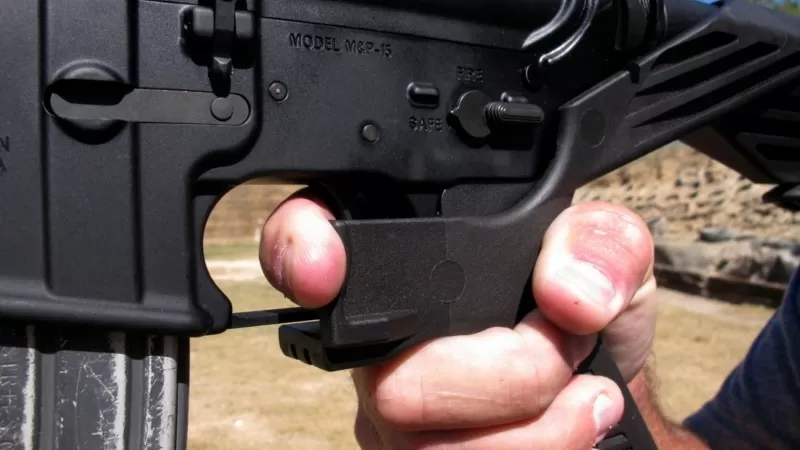On Friday, the Supreme Court made a historic decision to strike down a Trump-era ban on bump stocks, a rapid-fire gun accessory that was used in the deadliest mass shooting in modern U.S. history. The high court’s conservative majority found that the Trump administration did not follow federal law when it changed course from previous administrations after a gunman in Las Vegas attacked a country music festival with assault rifles equipped with bump stocks.
For those unfamiliar with bump stocks, it is an accessory that allows a gun to fire at a rate comparable to a machine gun. This was the case in the tragic 2017 Las Vegas shooting, where the gunman was able to fire more than 1,000 rounds in just 11 minutes, causing chaos, terror, and devastating loss. The Supreme Court’s 6-3 majority opinion, written by Justice Clarence Thomas, clarified that a semiautomatic rifle equipped with a bump stock does not qualify as an illegal machine gun because it still requires the trigger to be released and pulled for each shot fired.
This decision was met with support from Thomas’ fellow conservative justices, with Justice Samuel Alito emphasizing that it is ultimately up to Congress to change the law if they deem it necessary to classify bump stocks as machine guns. The decision to change the definition of bump stocks through regulation rather than legislation took pressure off Republicans in Congress to act or justify inaction following the Las Vegas massacre during Trump’s presidency.
However, not all justices were in agreement. In a dissent joined by her liberal colleagues, Justice Sonia Sotomayor pointed to the Las Vegas gunman and stated, “In murdering so many people so quickly, he did not rely on a quick trigger finger. Instead, he relied on bump stocks.” While acknowledging the need for Congress to take action, Sotomayor expressed her hope that they will finally act on this issue.
Former President Donald Trump’s 2024 campaign team released a statement expressing their respect for the court’s decision, but quickly pivoted to politics by touting his endorsement by the National Rifle Association. President Joe Biden, on the other hand, has not yet shared his opinion on the ruling.
The case was brought to the Supreme Court after a Texas gun shop owner challenged the ban, arguing that the Justice Department had wrongly classified the accessories as illegal machine guns. The Biden administration, on the other hand, supports the ban stating that bump stocks can enable weapons to fire at a rate of hundreds of rounds per minute. This ruling marks the latest gun-related case to come before the Supreme Court, with a conservative supermajority previously expanding gun rights in 2022 and currently weighing another case challenging a federal law intended to keep guns away from people under domestic violence restraining orders.
The arguments presented in this case were primarily focused on whether the Bureau of Alcohol, Tobacco, Firearms and Explosives (ATF) had overstepped its authority, rather than the Second Amendment itself. Justices from the liberal wing of the court argued that it was “common sense” that anything capable of unleashing a “torrent of bullets” should be considered a machine gun under federal law. However, conservative justices raised concerns about why Congress had not taken action to ban bump stocks and the implications of the ATF changing its stance a decade after initially declaring them legal.
The invention of bump stocks dates back to the early 2000s, but it wasn’t until the Las Vegas and Parkland, Florida shootings that the legality of these accessories was called into question. Under President George W. Bush and President Barack Obama, the ATF deemed bump stocks as not transforming semiautomatic weapons into machine guns. However, following the Las Vegas and Parkland shootings, the Trump administration urged the agency to reverse its decision, leading to the ban of bump stocks in 2019. This decision affected approximately 520,000 bump stocks in circulation, requiring owners to either surrender or destroy them, resulting in a combined estimated loss of $100 million.
The plaintiff in this case, Texas gun shop owner and military veteran Michael Cargill, was represented by the New Civil Liberties Alliance, a group funded by conservative donors such as the Koch network. Cargill’s attorneys argued that while bump stocks do allow for rapid firing, they require more effort from the shooter, making them fundamentally different from machine guns. The government, however, countered that the effort required is minimal and does not make a significant legal difference. The Justice Department also reaffirmed their belief that the ATF came to

